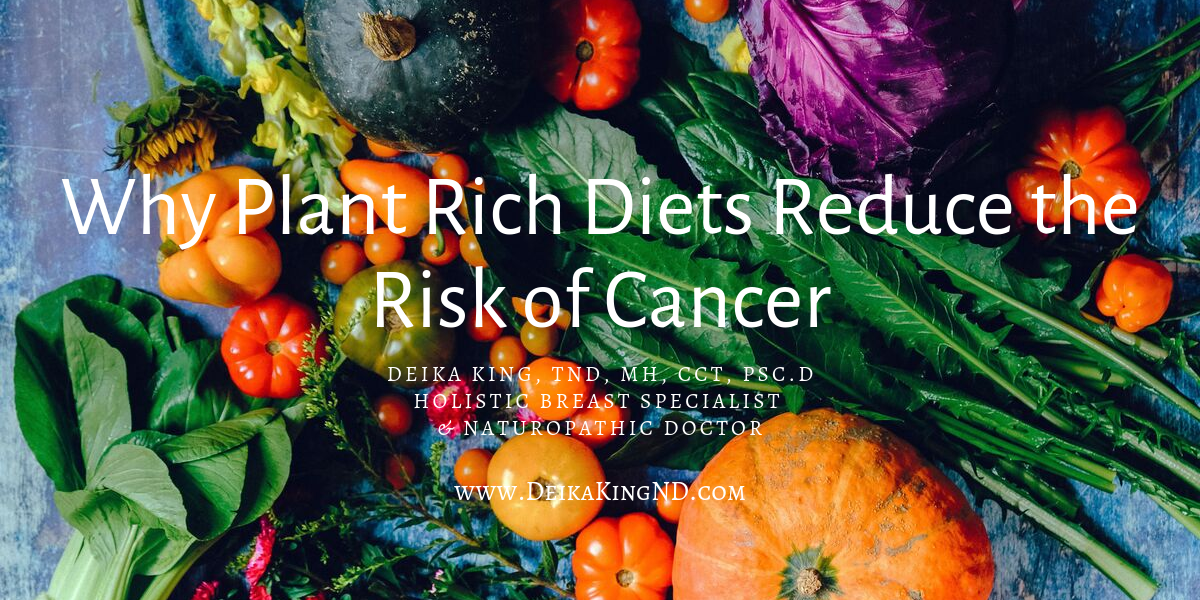You’ve likely heard before that diets high in plan-based foods are good for you for numerous reasons. Maybe it’s their healthy heart effects, or their ability to help you maintain a healthy body weight. Or of even greater importance, their ability to reduce your cancer risk.
Yet, you may not fully understand why it is that plant-based foods reduce these risks. That is exactly what we are going to shed some light on now.
It does not mean you have to go vegan or vegetarian. But after reading this you will definitely consider getting more vegetables in your diet.
Plant Based Foods Are High in Fiber
Fiber has many uses beyond helping maintain bowel regularity. It is something that is not placed at the front burner of health, but fiber, by keeping the transit of waste through the intestines and colon short, helps to decrease the time that waste spends in contact with the bowel walls. Prolonged contact of waste with the walls the intestines can lead to re-absorption of waste, or worse, negative changes to the cells in contact with the feces. This is particularly important for reducing risk of intestinal and colon-rectal cancers.
Plant Based Foods Are Rich in Vitamins
Vitamins have numerous important functions in the human body, extending beyond cancer prevention. Vitamins optimize metabolism (B-vitamins), are important co-factors in enzyme production, help to detoxify waste material, and much more. Vitamin deficiency can also compromise the efficiency of the immune system, reducing the system’s ability to destroy pre-cancerous cells.
Phytonutrients Are Trump Cards
If there is one thing that places plant-based foods above animal-based foods, it is the presence of phytonutrients. Phytonutrients are plant-specific compounds that serve a variety of functions in the human body. Ultimately, they work to ensure that processes happen the way they are supposed to, and that cells grow in a normal fashion.
As you may know, cancer results when cells do not follow the natural growth and death patterns of that specific type of cell. Instead, they grow uncontrollably and alter other healthy cells to do the same. Phytonutrients can help prevent that from happening, among other things.
In particular, phytonutrients are effective because:
- Phytonutrients Help Detoxify Waste- Waste material has the strong potential for causing cells to behave in an abnormal manner, resulting in either temporary diseases or longer-term cancer. By ensuring that waste is removed rapidly and efficiently, the time waste spends in contact with healthy cells is short.
- Phytonutrients are Powerful Antioxidants- Anti-oxidants donate one of their electrons to neutralize the effect that free radicals have on cells. Free radicals cause catastrophic damage and compel other cells to form more free radicals. This is one of the primary ways that the plant-based foods reduce cancer risk.
- Some Phytonutrients Prevent UV Damage- Some phytonutrients absorb dangerous UV radiation, thereby reducing the effect such radiation can have (on skin cells in particular). Radiation from the sun increases the risk of cancer development.
Plant Based Foods Bring About Genetic Changes
Diets high in plant food can reprogram the body to increase its efficiency in terms of metabolism, waste removal, and performance. This is noteworthy because you cannot alter your genetics, but you can “optimize” your body’s profile to reduce natural risks as much as possible.
Conclusion
Plant based foods should make up the majority of your diet. Leave the starches behind. Protein is essential, so we do not advocate that you remove foods from animals altogether but eat them in moderation and make plant-based foods the basis of your diet.
Deika King, TND, MH, CCT, PSc.D
Traditional Doctor of Naturopathy
832-422-7271







